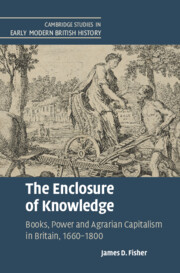Book contents
- The Enclosure of Knowledge
- Cambridge Studies in Early Modern British History
- The Enclosure of Knowledge
- Copyright page
- Dedication
- Contents
- Figures
- Tables
- Acknowledgements
- Notes
- Abbreviations
- Introduction
- Chapter 1 Rethinking Agricultural Books, Knowledge and Labour
- Chapter 2 Learning without Books
- Chapter 3 Standing on the Shoulders of Peasants
- Chapter 4 Learning without Labour
- Chapter 5 Dividing Head and Hand
- Chapter 6 Monopolising Knowledge
- Chapter 7 The Master Should Know More
- Conclusion
- Appendix
- Bibliography
- Index
Chapter 1 - Rethinking Agricultural Books, Knowledge and Labour
Published online by Cambridge University Press: 07 July 2022
- The Enclosure of Knowledge
- Cambridge Studies in Early Modern British History
- The Enclosure of Knowledge
- Copyright page
- Dedication
- Contents
- Figures
- Tables
- Acknowledgements
- Notes
- Abbreviations
- Introduction
- Chapter 1 Rethinking Agricultural Books, Knowledge and Labour
- Chapter 2 Learning without Books
- Chapter 3 Standing on the Shoulders of Peasants
- Chapter 4 Learning without Labour
- Chapter 5 Dividing Head and Hand
- Chapter 6 Monopolising Knowledge
- Chapter 7 The Master Should Know More
- Conclusion
- Appendix
- Bibliography
- Index
Summary
Chapter 1 sets out a new sociological model for analysing the relationship between agricultural books, knowledge and labour in early modern Britain. The first section argues that the major socio-economic trends in early modern agriculture, giving rise to agrarian capitalism, necessarily involved a concentration in managerial control and therefore required a change in the social system of knowledge. The second section explores recent sociological approaches to books, knowledge and labour. It concludes by summarising how these sociological insights can be applied to early modern agriculture to develop a new framework for understanding the cumulative social impact of printed information and advice. It establishes the basic research question pursued in later chapters: How did books contribute to new divisions of labour and new ways of controlling knowledge?
Keywords
- Type
- Chapter
- Information
- The Enclosure of KnowledgeBooks, Power and Agrarian Capitalism in Britain, 1660–1800, pp. 36 - 59Publisher: Cambridge University PressPrint publication year: 2022

